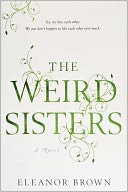The Weird Sisters
by Eleanor Brown
I’m a reader for whom the title “The Weird Sisters” immediately brings Macbeth’s witches to mind. I’d guess that I’ve got a slightly above average knowledge of Shakespeare, and I have to say that background certainly added to my enjoyment of Eleanor Brown’s lovely debut novel. It is rife with Shakespearian undertones, overtones—all kinds of shades and tones!
The Weird Sisters is, in fact, the story of three sisters. They aren’t that weird, but their upbringing was a bit on the unconventional side. Their father is a respected Shakespeare scholar, and the household was full of culture and absent-minded intellectuals. Dad quoted Shakespeare constantly, and Mom would forget cooking dinner when lost in a book or some other distraction.
Now the three sisters are grown and on their own. Eldest Rosalind (or Rose) is the most stable, a Ph.D. mathematician working in academia like her dad. Naturally a second daughter was named Bianca, after Kate’s sister in Taming of the Shrew. Like her namesake, Bianca (or Bean as she is fondly known) always wants to be the life of the party. She’s been living the high life in New York. And following the example of Lear, Professor Andreas named his third daughter—What else?—Cordelia. Cordy’s the true Bohemian of the family. She dropped out of school and has been living on the road for years.
As the novel opens, every member of the family finds themselves in some sort of trouble. At what should be the happiest time of her life, Rose is in an engagement that’s bordering on estrangement. Bean has just been fired for embezzling from her employers; the high life costs a lot to maintain. And Cordy, well, she’s just knocked up. Their various troubles may be the catalysts that bring them home, but upon arriving they face the daunting reality that is their mother’s fight against breast cancer.
Ms. Brown knows that there’s plenty of drama to be mined from the relationships of adult children suddenly under the same roof again for the first time in a decade. Mix in a whole lot of the Bard, as well as a soupçon of Dylan Thomas, a dash of Greek mythology, and a host of other literary and cultural references, and you’ve got a fizzy brew that goes down easy.

I really enjoyed this book, and I'm amazed that I read it before you did!
ReplyDeleteYes, well, clearly I've fallen behind. I blame ABNA. But I'm so glad we're in agreement again!
ReplyDelete